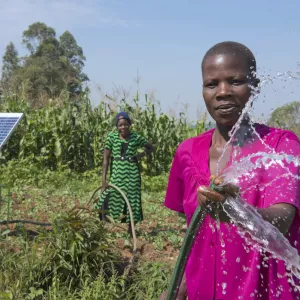WLE at COP26: Sustainable water solutions essential to climate change adaptation in agri-food systems
Water is essential for all of Earth’s ecosystems and the food systems they support. However, as climate change becomes more pronounced, water resources are coming under increasing strain. Higher temperatures, shifting weather patterns and less predictable rainfall are leading to deteriorating water quality, less reliable water availability and rising water scarcity. As the biggest user of freshwater – responsible for

WLE at COP26: Sustainable water solutions essential to climate change adaptation in agri-food systems
Water is essential for all of Earth’s ecosystems and the food systems they support. However, as climate change becomes more pronounced, water resources are coming under increasing strain. Higher temperatures, shifting weather patterns and less predictable rainfall are leading to deteriorating water quality, less reliable water availability and rising water scarcity.
As the biggest user of freshwater – responsible for 70% of global freshwater withdrawals – agriculture is uniquely and increasingly exposed to these climate-induced risks. If farming is to mitigate and adapt to climate change, it must adopt sustainable, climate-smart agricultural water management (AWM) practices and technologies.
To explore the potential of AWM for climate resilience, WLE has teamed up with the CGIAR Research Program on Climate Change, Agriculture and Food Security (CCAFS) to host an hour-long session at COP26, the United Nation’s Climate Change Conference in Glasgow. On Tuesday, November 9, ‘…
Photo credit: Jeffery M Walcott/IWMI

